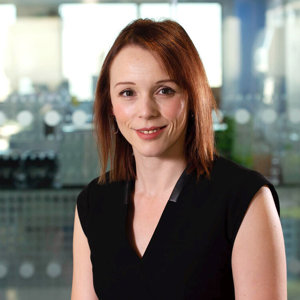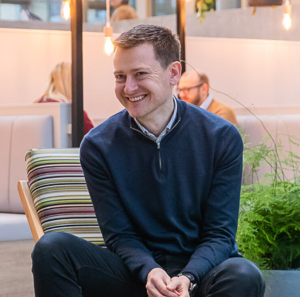In Innovation Real Estate, Experimentation is Essential
Five part Q&A with Dr Kath Mackay, Director of Life Sciences, and Sam Darby, Head of Development, Bruntwood SciTech
1. How do companies like Bruntwood SciTech act as real estate enablers for innovative industries in the Oxford-Cambridge Arc?
Dr Kath Mackay: Bruntwood SciTech serves as the leading provider of specialist property and innovation services for the science and technology sector. A 50:50 joint venture between Bruntwood and Legal & General, Bruntwood SciTech’s network now includes campuses in Cambridge, and more recently in Oxford.
We’ve got 10 campuses in six locations across the country: Birmingham, Leeds, Liverpool, Cheshire, Manchester, Cambridge and Oxford. This geographic spread means we can take a pan-UK view on how regions react to different opportunities.
We see ourselves very much as a property enabler, working to ensure world-class facilities. We offer laboratories, offices of various types, supporting science services, and access to shared laboratories with pay as you go access to equipment. We also offer a wealth of innovation and business support, which we see as fundamental and complementary to our real estate offering. We look at supporting our customers holistically, with targeted programs of business support which support SMEs in sourcing investment, commercialising products and services, and scaling more advanced businesses.
2. Start-ups in high-technology industries often have irregular growth patterns and variable demand for commercial real estate. How has Bruntwood SciTech facilitated this need for flexibility?
Dr Kath Mackay: Bruntwood SciTech’s campuses are now home to over 500 companies, and we have exciting plans to grow the business through further acquisitions, the development of new partnerships as well as growing our existing campuses. We aim to provide 40,000 high value jobs over the next 10 years. How are we going to achieve this? – through our deep understanding of the sectors in which we work. We look for those with science and tech backgrounds, and experience in government and corporate roles, and employ people who understand the idiosyncrasies of life science and tech companies and what makes them tick. This is especially important from a facilities and real estate point of view: not all real estate developers have this capability, but we believe it’s vital to have a deep understanding of our customer base and what its unique needs are.
Sam Darby: To add to that, expertise in-house helps to inform the client brief. We need to make sure what we are delivering is what the market requires. If we have people who come from a science or tech background, they have better knowledge of what the market needs and can help put together a specification that is fit for purpose. It’s not easy to transition to a science supportive mindset without this. There is no typical lab that caters for all needs, all of them are bespoke in their own way and require certain kit and temperature controls depending on what the scientists and researchers are doing.
We work on creating a good product mix, appreciating the need for flexibility, and the need for slightly different specifications. For example, we have recently experienced new demand for high-density chemistry space, which is normally very costly in construction - but using Bruntwood SciTech’s expertise and flexible approach means we can deliver something fit for purpose in an economic way.
3. How has the ‘triple helix’ concept worked in practice for Bruntwood SciTech and for wider high-tech industries?
Dr Kath Mackay: Locating ourselves in the Arc allows us to align and work more closely with even more universities and key partners, and work in conjunction with additional civic, academic, and corporate partners. Many joint ventures utilise their expertise to collaborate across these spaces. We’ve seen the benefits of this elsewhere, such as in Manchester for example where we work closely in partnership with the City Council, the city's universities and the Manchester University NHS Foundation Trust. At Manchester Science Park and Citylabs for example we’ve used our skills in redevelopment, our vision and ambition alongside other key stakeholders including the universities and NHS trusts to transform the campus into something really special. They’re one of the most established science and tech clusters in the UK, with a mixture of life science and tech companies, including those working in medtech, digital health, diagnostics and precision medicine who, through our partnership with the NHS are able to gain direct access for trialling and adopting their products or services at an accelerated rate, supporting faster growth of these businesses.
Sam Darby: Within the Arc the spatial dynamics are also very important. Fundamental to our acquisition of the Melbourne Science Park was TTP building a facility adjacent to the Park, providing a spillover of ideas and knowledge capital. What TTP found attractive was our wider UK network, our experience with joint ventures, and the 500 businesses we already have located across our campuses.
With the problem-fixers of the tech world in TTP moving to a site next door, we see the importance of having a key stakeholder and like-minded business co-located with us, contributing to building up local SMEs and working with us to scale them up.
4. Are there any specific trends in occupier demand that you’re noticing?
Sam Darby: We appreciate that many businesses are on different paths in their journey, and we know the difficulties of scaling up and work with them to overcome issues related to real estate. Flexible leasing for offices has been available for over twenty - thirty years at Bruntwood, and we’re now bringing that into the life sciences and innovation sectors to provide flexibility so that companies aren’t being restricted in their growth by their lease.
Dr Kath Mackay: In the same spirit we also offer open-access labs, which provide access to specialist equipment and infrastructure in a flexible and cost effective manner, enabling companies to grow without having to spend all their seed capital or investment on laboratory space. We either put the kit in ourselves, or partner with a supplier. This helps us to support those seed-stage organisations with incredible ideas while they’re finding their feet as a commercial enterprise.
Larger customers, having reached a certain size, two-to-three floors and outgrowing their current space, tend to bring a design team with them to explore more customisable options.
5. How is Bruntwood SciTech approaching the opportunities in the Oxford-Cambridge Arc? What are the challenges?
Sam Darby: Our acquisition and development strategy is informed by our deep knowledge of creating facilities for science and technology companies within ecosystems, such as in Birmingham and Manchester. We had to really transform Alderley Park for example, from a single occupier campus, to one housing over 200 businesses advancing many different products and technologies across life sciences, with many different needs. We’re doing the same with Begbroke Science Park in Oxford and Melbourn Science Park in Cambridge. Bruntwood SciTech is really at the forefront of this process from a technical laboratory view, understanding that not all laboratories are equal when considering business needs.
Dr Kath Mackay: In the near future we will be very closely working with entrepreneurs to support the formation and growth of their companies, offering small labs and individual benches and business support which we’ve seen great success with in other cities and Bruntwood SciTech locations. This will include access to much-needed talent, finance and funding opportunities, accelerated access to new markets, and connections into our large national partner network. Each city, location, and sub sector of life science and tech business has different needs and through the success of our existing business support programmes we will take the learnings from them and put them into place in the Oxford-Cambridge Arc.
We’ll also work closely with corporates in the region to develop integrated innovation programmes which address their current challenges and can accelerate the adoption of innovation. We’ve seen great success with such programmes in, for example, Birmingham, where we’ve worked with the likes of the NHS, Gymshark, HS2 and Balfour Beatty, matching up innovative, pioneering startups who have business ideas that can provide solutions to corporate innovation challenges.
Sam Darby: With Melbourn Science Park being located 9 miles outside of Cambridge, we really need investment in frequent transport links to make commuting easier and promote good public transport. We are currently looking at the likes of private dedicated Park shuttle buses to support travel to and from the Park and from a green travel perspective, we also need to keep ensuring we can provide cycle facilities to and from our campuses. Investment in connective capital for science parks and campuses will be vital for initiatives like the Melbourn Science Park to take off and succeed.
Get in touch




